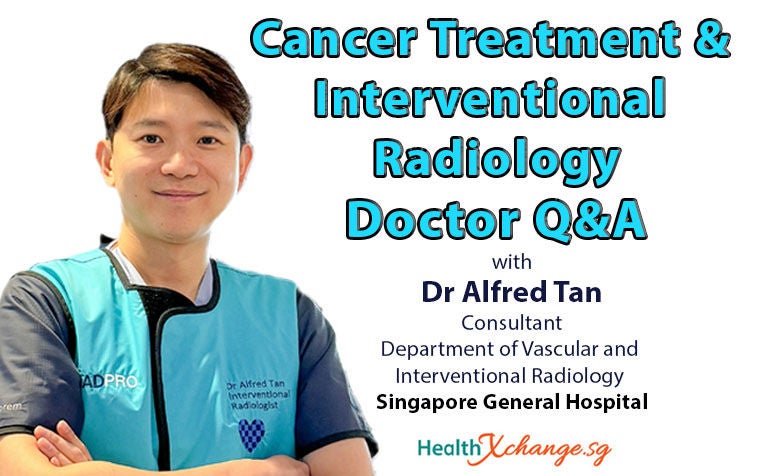
Dr Alfred Tan , an Interventional Radiologist, answers your questions about the use of interventional radiology in treating cancer.
In this ‘Ask the Specialist’ Q&A forum, Dr Alfred Tan, Consultant from the Department of Vascular and Interventional Radiology at
Singapore General Hospital (SGH), a member of the SingHealth group, answers your questions about interventional radiology in cancer treatment. This Ask The Specialist forum has closed. Thank you for participating. Scroll down to see all questions and answers submitted for this forum. |
Interventional Radiology (IR) stands as one of the key players in the care and treatment of cancer in Singapore.
Interventional Radiology (IR) allows the diagnosis and treatment of cancer and other conditions without major surgery.
At its core is the Interventional Radiologist, a specialist doctor with unique training focused on diagnosing, treating, and bringing relief to cancer patients.
The approach of an Interventional Radiologist centres around minimally invasive procedures, ensuring quicker recovery and timely discharge for patients.
As skilled diagnosticians, an Interventional Radiologist interprets x-rays, ultrasound, and CT scans, aiding in cancer diagnosis and conducting essential biopsies for accurate tissue sampling. This enables oncologists to make well-informed decisions about the most effective treatment options.
Beyond diagnostics, Interventional Radiologists provide innovative therapies:
Ablation procedures, using a needle to precisely apply heat or cold to destroy tumours, as well as embolization procedures that allow targeted delivery of treatment medications to blood vessels supplying tumors.Interventional Radiologists also play a crucial role in inserting essential lines for chemotherapy administration.
In palliative care, an Interventional Radiologist helps to provide pain relief to ease symptoms in cancer patients.
This holistic approach reflects the comprehensive involvement of Interventional Radiology in improving the overall well-being of cancer patients in Singapore.
If you have a question about interventional radiology for cancer treatment, take this opportunity to ask it now!
About Dr Alfred Tan
Dr Alfred Tan, is an Interventional Radiologist at the Department of Vascular and Interventional Radiology, Singapore General Hospital (SGH).
His field of interest include arterial and venous vascular interventions, embolisation for benign and malignant conditions and interventional oncology procedures.
Dr Tan also has a keen interest in education and regularly mentors students from the local medical schools.
Questions and answers on cancer treatment and interventional radiology
1. Question by Chandran
Hi Dr,
I am suspected to have lung cancer and am due to have a PET/CT scan to be done at the department of nuclear medicine and molecular imaging in SGH.
Can your proposed radiological treatment work instead of surgery?
Answer by Dr Alfred Tan
Thank you for your question Chandran.
One interventional radiology (IR) treatment option for lung cancer is lung ablation. Ablation involves the direct insertion of a needle into the tumor to either heat or freeze it. The needle is carefully placed into the tumor with the guidance of CT imaging, ensuring precise targeting to effectively eliminate the cancer cells.
This minimally invasive procedure requires a cut of less than 5 mm to the skin and is performed under general anesthesia to prioritise patient safety and comfort. The advantages of this approach include its minimally invasive nature, facilitating quicker recovery and shorter hospital stays.
However, it's important to be aware of moderate risks such as bleeding and air leaks, which your consulting doctor will thoroughly discuss with you to enhance your understanding.
It is crucial to emphasise that the selection of interventional radiology treatment is dependent on various factors, including the number, size, and location of the lung cancer, as well as your overall health. Treatment decisions are typically reached through discussion with a diverse team of healthcare professionals, including oncologists, interventional radiologists, and surgeons. Other available treatment options encompass surgery, chemotherapy, radiotherapy, or a combination of therapies.
As every individual case is unique, it is essential to engage in a detailed discussion with your healthcare team to tailor the most suitable treatment plan for your specific situation.
Thank you.
Ref: H24

















 Get it on Google Play
Get it on Google Play